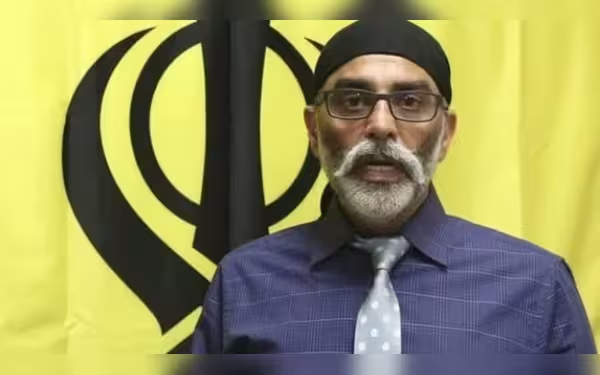Saturday, November 16, 2024 10:26 PM
Rahul Gandhi's Remarks on Sikh Threat Fuel Khalistan Referendum
- Gandhi acknowledges Sikhs face an existential threat in India.
- Pannun claims Gandhi's statement boosts Khalistan movement support.
- Religious freedom struggles highlighted in Gandhi's address.
 Image Credits: geo
Image Credits: geoRahul Gandhi's acknowledgment of Sikh threats may energize the Khalistan Referendum, highlighting ongoing struggles for religious freedom in India.
In recent discussions surrounding the political landscape of India, a significant statement made by Indian opposition leader Rahul Gandhi has sparked considerable attention. During an event in Washington DC, Gandhi acknowledged that Sikhs are facing an "existential threat" in India. This declaration has been interpreted by many, including Gurpatwant Singh Pannun, the Counsel General of Sikhs For Justice (SFJ), as a pivotal moment that could energize the Khalistan Referendum campaign, which advocates for the independence of Punjab.
Pannun emphasized that Gandhi's remarks could serve as a catalyst for increased support for the Khalistan movement. He criticized extremist groups such as the Bharatiya Janata Party (BJP), Rashtriya Swayamsevak Sangh (RSS), and Jana Sangh, labeling them as adversaries of Sikhs and Punjab. According to Pannun, these groups are attempting to undermine the reality of Sikh persecution in India under Prime Minister Narendra Modi's administration.
In his statement, Pannun remarked, "Gandhi's statement not only justifies the Khalistan referendum for the independence of Punjab, but it also reflects a realization by the Congress party that Punjab is on the verge of seceding from the Union of India to become an independent Sikh country, a new neighbor of Pakistan and India." This assertion highlights the growing sentiment among some Sikhs that independence is a viable option.
Gandhi's comments were made during an address to a gathering of Indian Americans in Herndon, Virginia, where he pointed out the challenges Sikhs face in expressing their identity, particularly regarding the wearing of turbans and religious practices. He stated, "The fight is about whether a Sikh is going to be allowed to wear his turban in India or a kada in India. Or he, as a Sikh, is going to be able to go to a gurdwara. That's what the fight is about. And not just for him, for all religions." This statement underscores the broader struggle for religious freedom and cultural identity in India.
Pannun further called out specific leaders from the BJP and RSS, asserting that they will be held accountable for their actions against Sikhs. He urged Prime Minister Modi to recognize the aspirations of the people of Punjab, who are increasingly seeking independence through the global Khalistan referendum.
The implications of Gandhi's statement are profound, as they not only reflect the current political climate but also resonate with the historical grievances of the Sikh community. As discussions about identity, freedom, and autonomy continue, it remains to be seen how these developments will shape the future of Punjab and its relationship with the Indian Union.
The acknowledgment of the challenges faced by Sikhs in India by a prominent political figure like Rahul Gandhi may serve as a turning point in the ongoing dialogue about Punjab's future. As the Khalistan Referendum gains momentum, it is essential for all parties involved to engage in constructive discussions that prioritize peace, understanding, and the rights of individuals to express their cultural and religious identities freely.













